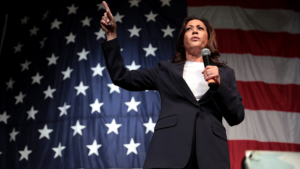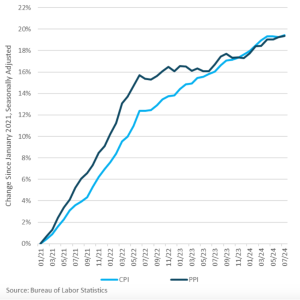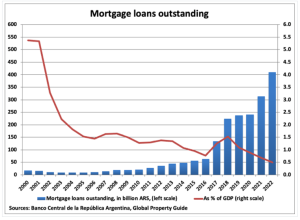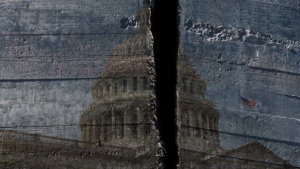Life, Liberty, Property #73: the Harris plan, such as it is, blames “price gouging” for Bidenflation, and promises new, unfunded spending.
by S.T. Karnick
IN THIS ISSUE:
- The Harris Plan, Such As It Is
- Harris’s Housing Problem
- A Strong Historical Case for Nullification
- Cartoon

The Harris Plan, Such As It Is
Vice President and presumptive Democrat presidential nominee Kamals Harris outlined what the press is calling an “economic agenda,” in a widely anticipated speech in Raleigh, North Carolina on Friday.
The Wall Street Journal summarized the vice president’s proposals as follows:
In Friday’s roughly 25-minute speech, the vice president and Democratic nominee proposed restoring the expanded child tax credit of up to $3,600 a child, which was put in place in 2021 amid the Covid-19 pandemic and expired at the end of that year. She also threw her support behind a new further expansion of the tax credit that would provide up to $6,000 in total relief for middle- and low-income families during the first year of a child’s life.
Both tax-credit proposals would require congressional approval, and could face opposition from Republicans. Some GOP lawmakers, including Sen. JD Vance, Trump’s running mate, have also called for an expansion of the tax credit.
Harris also mentioned “alleged corporate price gouging and lowering costs for families, including the price of prescription drugs,” the WSJ reports. “Rising prices have become a point of debate between Harris and Trump, the Republican presidential nominee.”
I do not endorse labeling the speech as an agenda, given that “Harris’s campaign didn’t lay out the costs of her proposals or propose a plan for paying for them,” as The Wall Street Journal reported.
Harris said she will create an “opportunity economy” by “building up our middle class,” echoing the rhetoric she and President Joe Biden have continually used to redefine their destructive, big-government, antibusiness policies.
Harris proposes to fight inflation with “a federal ban on price gouging that would push the Federal Trade Commission and state attorneys general to investigate how corporations exploit consumers by raising prices for profit,” Raleigh TV station CBS-17 reported.
That certainly will not stop inflation, which has basically stopped already anyway. Punishing some businesses and economic sectors for raising prices will not halt a general increase in prices. The money will flow to other sources, artificially inflating those prices instead. Fighting alleged price gouging will only create a further misallocation of assets economywide by distorting price signals even more. That will add to the countless economic distortions the government already imposes on the economy, including via inflation itself.
There is in fact no price gouging problem. As Unleash Prosperity (UP) comments, “ace economist EJ Antoni has noted that producer prices have risen at almost the precise rate that consumer prices have risen.” UP supplies a graph that shows the increases in the consumer price index have been driven by increases in producer prices, not profits:

Consumer prices rose for the same reason producer prices rose: generalized inflation caused by the Federal Reserve having to monetize the Biden-Harris administration’s surreal increase in federal debt. UP summarizes it well:
Producers and businesses aren’t gouging, Kamala. They are charging prices that cover their costs. The government doesn’t have to do that, because under your administration, they will continue to run $2 trillion deficits from now until the cows come home. Private companies are in business to make a profit. If they don’t, they are soon out of business.
Harris’s rhetoric is all too familiar. President Joe Biden blamed businesses for inflation while claiming to fight for working Americans. Harris is doing the same. Why would the result be any better this time?
Harris is counting on a large swath of the public never learning from their mistakes. Perhaps she will be vindicated in that assessment. It seems at least a bit cynical, however.
Prices are much higher than they were two years ago. Real, after-tax personal income has decreased. People are struggling to pay their bills. Harris proposes to play whack-a-mole with individual businesses’ prices. The very idea is patently absurd.
Harris is replaying Biden’s sneakily euphemized antibusiness stance and reusing his badly mildewed populist rhetoric to disguise the socialist design behind her plans. Harris has a history of hard-left opinions on the economy as the farthest-left U.S. Senator of her time, outpacing even Bernie Sanders and Liz Warren. Given that Biden failed to convince the public inflation was being caused by corporate greed, it is unlikely Harris will succeed by taking the same path, though, of course, the press will do their very best for her.
It appears the November presidential election will come down to issues other than inflation—most likely centering on the monumental question of whether the voters hate her opponent’s dyspeptic tweets more than her frivolous socialism.
Sources: The Wall Street Journal; CBS-17 (Raleigh, NC); Unleash Prosperity

Harris’s Housing Problem
The high cost of housing is a big problem for the presumptive Democrat presidential ticket.
Inflation raised rental prices and the nominal monetary value of the housing stock across the nation during the Biden administration, while the high interest rates the Federal Reserve imposed to slow the devaluation of the dollar further increased the costs for new homebuyers. Average household debt service payments as a percent of disposable personal income rose from 3.47 percent in January 2021 to 4 percent in the first quarter of 2024:
Home purchase prices reached record highs this year. “Home-buying affordability dropped last fall to the lowest level since September 1985, and it fell near that level again in June,” The Wall Street Journal reported on Friday. New home sales crashed accordingly, declining by 14.9 percent in May.
Rental prices rose rapidly as well. “The rent-to-income ratio has increased from about 27.5% to 30.1% over five years,” Yahoo! Finance reports on a study from BadCredit.org. “Rent has increased by 32.6% over five years, while the median income has increased by only 20.8%.”
Unsurprisingly, “Housing costs have emerged as a key concern for Americans as the real estate market contends with the double-whammy of high mortgage rates and a dearth of supply, pushing the cost of owning a [sic] 26% higher than it was in 2020, according to a recent Redfin analysis,” Newsweek reports. “With many would-be buyers on the sidelines, the effect has been a red-hot, competitive rental market that has further pushed up prices.”
As a result of all this, “Housing is one of the thorniest economic issues facing [Vice President] Harris, with voters naming the cost of rent and high mortgage rates as a growing concern,” The Wall Street Journal reported on Friday.
All this trouble and woe could have been avoided quite easily. The inflation was caused by excessive federal spending—and consequent massive increase in federal debt—enacted in 2021 and 2022 by the Biden-Harris administration and Democrat-controlled Congress with no Republican yes votes on most of the legislation.
President Joe Biden never considered cutting spending, and Harris was in lockstep with his overspending agenda. Instead, when Biden finally decided to address housing price inflation in July of this year, his proposed solution was a big increase in federal interference in the housing market.
“President Joe Biden has proposed federal rent control measures, saying they’re needed to protect tenants from corporate landlords,” Newsweek reports. “He proposed limiting rent hikes to 5% a year for the next two years for landlords with more than 50 units.”
Biden also called for “a new $10,000 tax credit for first-time home buyers and providing as much as $25,000 in down-payment assistance for first-generation home buyers,” the WSJ noted.
Harris has echoed those ideas on the campaign trail. Harris “recently indicated support for [national] rent controls, saying at her first major rally since becoming the nominee that she wanted to ‘take on corporate landlords and cap unfair rent increases,’” Newsweek reports. “In 2019, after Oregon passed a statewide rent control measure, she praised the bill on Twitter.”
On Friday, Harris added to the Biden plans for more government intervention in the housing market, calling for the construction of three million new housing units in the next four years and proposing “a new tax incentive for companies that build homes for first-time buyers,” the WSJ reported. Biden had called for the building of two million new homes.
In addition, “Harris will propose a $40 billion fund to help local governments develop innovative solutions to the lack of housing supply. It is an expansion of a similar $20 billion fund proposed by the Biden administration,” the WSJ noted.
Harris even proposes telling landlords what software they can use.
“She will also endorse legislation that would crack down on the use of property-management software that has allegedly been used by landlords to fix apartment rent prices at buildings across the U.S.,” the WSJ reported.
All of this, of course, is the standard progressive-left response to any problem that may arise: more restrictions on the people.
None of these proposed interventions are needed, and all of them would be enormously destructive.
The right way for government to relieve a housing shortage is simple: remove the government rules that are the cause of the problem.
Argentina had vastly worse housing problems than the United States just a few months ago. The country had suffered decades of inflation and long bouts of hyperinflation under democratic-socialist governments. The inflation led to extremely high interest rates to compensate for the ongoing currency devaluation—the key interest rate of Banco Central de la República Argentina rose to 97 percent in May of last year.
“Argentina’s very high inflation rates made granting peso-denominated mortgages too risky for banks,” Global Property Guide (GPG) reported in August 2023. “In 2015, the number of new mortgages in Argentina slumped to its lowest level in 15 years, accounting for just 1% of the country’s total GDP—the lowest in Latin America, according to a recent report by the Housing Finance Information Network. This was down from 5.4% in 2000.”
In 2017, the Argentine government offered subsidized mortgages “to around 90,000 locals with monthly incomes ranging from ARS 16,000 (US$69) to ARS 32,000 (US$138),” GPG reported. It did not help: “During 2022, the size of the mortgage market was equivalent to just about 0.5% of GDP, down from 1.52% of GDP in 2018 and 5.36% of GDP in 2000,” GPG reported.

In addition, the Argentine government imposed rent controls nationwide, with a 2020 law capping rent hikes and security deposits, requiring leases last at least three years, and making it extremely difficult to evict nonpaying tenants. The government also forced owners to accept pesos instead of dollars. Landlords could not afford to rent out their apartments, because the country’s high inflation rate and restrictions on rent changes meant the rent they received would rapidly decrease each month. Apartment rental prices in Buenos Aires rose by 64 percent in 2021.
Landlords increasingly left apartments vacant, evidently awaiting better times. An estimated one in seven homes in Buenos Aires was untenanted at the end of 2023.
Better times arrived with the election of libertarian economist Javier Milei to the country’s presidency in November 2023. The Milei government removed the rent controls on December 29, and “Buenos Aires saw a doubling of available rental units, and rental prices have stabilized,” Newsweek reports. “Under the new rules, landlords and tenants have more freedom to agree on lease terms. If the duration isn’t specified, it defaults to two years.”
With the removal of rent controls, the housing supply expanded rapidly as landlords were once again able to rent apartments that had been sitting empty. “The supply of rental housing in Buenos Aires has jumped by 195.23%, according to the Statistical Observatory of the Real Estate Market of the Real Estate College (CI),” Newsweek notes.
Government intervention to manipulate the housing market always backfires, as the experience in Argentina shows and in fact has been confirmed all around the world. If there is one thing economists of all stripes generally agree on, it is that rent controls do not work. The same is true of other government intrusions into the housing market and other areas of the economy, including those Harris is proposing.
It is important to remember that the Constitution does not authorize Congress or the president to mess about with the housing market. No president should sign any bill that does so in any way—much less propose such unconstitutional actions. Note that the Supreme Court’s perversion of the Interstate Commerce Clause starting in the 1930s does not make such intrusion constitutional. It simply means the president is the only national entity available to defend the public from such unconstitutional measures passed by Congress.
These interventions are feckless in addition to being unconstitutional. “Biden and Harris, like previous presidents and vice presidents, are limited in their ability to significantly lower housing prices, because housing costs are influenced by interest rates and the supply of and demand for homes,” the WSJ notes. “Both factors are largely out of their direct control.”
Technically that is true, but in practical terms it is dead wrong. Presidential actions have an enormous effect on interest rates and the housing market, through federal debt.
What is in the direct control of a U.S. president is federal spending.
It just so happens that excessive federal spending and an enormous addition to the national debt created this housing “crisis” in the first place. Biden could have prevented that by honorably vetoing those spending bills, but instead he encouraged their passage and complained they were not even more extravagant and wasteful.
As president, Harris would have full power to prevent further profligacy and in fact reverse the foolish overspending imposed by previous Congresses and presidents over the decades. Instead, Harris proposes to worsen this problem and countless others by doubling down on Biden’s irrational, unconstitutional, and enormously damaging spending spree.
Sources: The Wall Street Journal; Yahoo! Finance; Newsweek; Global Property Guide
 A Strong Historical Case for Nullification
A Strong Historical Case for Nullification
As I mentioned in the item immediately above, the president of the United States is the only person in the federal government who can defend the public from unconstitutional measures passed by Congress and potentially upheld by the U.S. Supreme Court as constitutional despite the plain reading of the Constitution.
There is, of course, another level of government that shares authority with the national government: the states. Nullification of federal laws has been anathema since the early days of the republic, even though the Constitution by its very nature and its wording not only allows it but insists on it.
In an ongoing discussion at Law and Liberty, Mises Institute Senior Fellow Tom Woods points out that the dispute over the constitutionality of state nullification of federal laws is based on the premise that the states handed over all their sovereignty to the national government when they ratified the Constitution, and that the states’ authority is subordinate to that of the feds:
The root of our disagreement goes back to the competing theories of the Union—the nationalist theory, whereby the United States is and always was a single, indivisible whole, with spokesmen like Daniel Webster and Joseph Story, and the compact theory of the Union as a collection of states with liberties of their own that preceded the Union, with proponents like Thomas Jefferson and Abel Upshur—that have defined American history.
A big flaw in the anti-nullification argument is the lack of historical support for the nationalist theory among the founders, writes Woods: “As I lay out in my book, I have found no systematic rendition of the nationalist theory anywhere until the 1830s, but ample descriptions of the compact theory (historian Brion McClanahan rightly calls it the compact fact) throughout the 1790s,” Woods writes.
The nation’s founders, Woods notes, “created something very different from the consolidated nation that grew out of the French Revolution and that came to dominate the Western political landscape.”
This dispute is of great importance because the argument against nullification relies heavily on the Constitution’s Supremacy Clause: “This Constitution, and the Laws of the United States which shall be made in Pursuance thereof; and all Treaties made, or which shall be made, under the Authority of the United States, shall be the supreme Law of the Land; and the Judges in every State shall be bound thereby, any thing in the Constitution or Laws of any State to the Contrary notwithstanding.”
If the federal government is ultimately sovereign, the states are indeed subordinate. That is not the case, however, and never has been. Woods writes,
In the American system no government is sovereign, not the federal government and not the states. The peoples of the states are the sovereigns, and their ratification conventions are the expression of their highest sovereign voice. It is they who apportion powers between themselves, their state governments, and the federal government. In doing so, they are not impairing their sovereignty in any way. To the contrary, they are exercising it.
The Ninth and Tenth Amendments to the Constitution clearly confirm this:
Ninth Amendment: The enumeration in the Constitution, of certain rights, shall not be construed to deny or disparage others retained by the people.
Tenth Amendment: The powers not delegated to the United States by the Constitution, nor prohibited by it to the States, are reserved to the States respectively, or to the people.
The Constitution and Bill of Rights establish a central government with limited, enumerated powers and does not transfer sovereignty from the people to either the national government or the states. It would have been foolish for the states to create an all-powerful central government, and they did nothing of the kind, Woods notes:
It would seem prima facie unlikely that the states would have ratified a Constitution with a Supremacy Clause that said, in effect, “This Constitution, and the Laws of the United States which shall be made in pursuance thereof, plus any old laws we may choose to pass, whether constitutional or not, shall be the supreme law of the land.”
Although lawmakers and courts have long assumed the nationalist theory is true, especially based on the arguments of pioneering Supreme Court Chief Justice John Marshall, the historical documents and debates say otherwise, Woods writes:
My co-author and Madison and Jefferson biographer Kevin Gutzman, whom I mentioned above, has the benefit of a PhD in history from the University of Virginia as well as a law degree. It is from that vantage point that Kevin is able to warn people: “Never confuse ‘constitutional law’ with the Constitution.” “Constitutional law” is what they teach in law schools, where even right-of-center students have their brains colonized by the evidence-free nationalist theory of the Union. Students learn a bunch of famous cases rather than the Constitution per se. Well, were these cases correctly decided? As Ayn Rand would say, blank out. James Madison said we should look to the state ratifying conventions to find the meaning of the Constitution. Number of John Marshall references to the state ratifying conventions? Zero.
Even Alexander Hamilton, one of the most centralist of the founders, accepted that the Constitution conferred to the federal government only its enumerated powers and did not authorize any actions beyond them, Woods notes:
Alexander Hamilton, at New York’s ratifying convention, said that while on the one hand “acts of the United States … will be absolutely obligatory as to all the proper objects and powers of the general government,” at the same time “the laws of Congress are restricted to a certain sphere, and when they depart from this sphere, they are no longer supreme or binding.” In Federalist #33, Hamilton further noted that the clause “expressly confines this supremacy to laws made pursuant to the Constitution.”
If unconstitutional laws are not binding on the states and the people, then nullification is only a confirmation of what is already true: the laws in question are null and void. By declaring such laws improper, the states would be doing exactly what the Constitution requires.
An additional argument on which anti-nullification people rely is that it would lead to conflict and chaos, with the states defying the federal government willy-nilly and making the execution of valid national laws impossible. Woods quotes Law & Liberty contributor Mark Pulliam as cautioning against nullification for this reason (among others) and as arguing that the states and the people should limit their response to attempting to change federal lawmakers’ minds: “Citizens dissatisfied with perceived federal encroachment should resort to the tools of democratic self-government—protests, state and federal political activism, the Article V amendment process, or legal challenges,” Pulliam wrote.
Woods’ reply: “All right, I’ll bite: how’s that been working out?”
The correct answer is “badly and moving toward catastrophically,” in my view.
Given the woeful present state of governance in the republic, Woods counsels the states and the people to give serious consideration to nullification on practical grounds:
I am all for trying whatever might work in a particular situation, and of course nullification is not and cannot be the solution to all our problems. But the burden of proof here belongs on Pulliam, who advocates persisting in the status quo, to demonstrate to me that the same strategies that have failed to restrain the federal government for over a century will, one of these days, suddenly start working.
In Nullification I give my own reasons to doubt that nullification would lead to the kind of chaos that Hobbesians expect. But even if it did, it would be a question of choosing your evil. Which concerns you more: a completely out-of-control regime, or the possibility that some federal laws (let’s face it, almost surely terrible and unconstitutional anyway) go unenforced?
I am more concerned by the out-of-control regime, by far. Anyone who is not a big beneficiary of that regime should feel the same way. Anyone who is a big beneficiary of that regime should take the honorable course and stop accepting its bribes.
Agreement with the long-held but wrong nationalist theory of the U.S. system of government works to the full advantage of leftist centralizers. Thus, today it is a conservative attitude in the worst sense of the word. Woods writes,
The enemies of civilization have grown accustomed to seeing us occupy the role of feckless losers, who dutifully play by rules laid down by people who hate us. Nullification is a Jeffersonian tool, and it has deep roots in American history. Without it, we end up with a regime like the one governing us now. So we can play the role of tame, domesticated losers, or we can open that Overton Window nice and wide, and let some fresh Jeffersonian air blow right on in.
The government of the United States is out of control, spending on an unsustainable trajectory while ruining the nation’s economy, crushing individual enterprise, and undermining the character of the people. Further progress down that way will lead to collapse within a matter of a few years. Far from being a threat to the constitutional authority of the federal government, nullification is one of the few courses of action that can help save it from self-destruction.
Source: Law & Liberty
Cartoon

For more Rights, Justice, and Culture News.
For more Budget & Tax News.
For more from The Heartland Institute.











